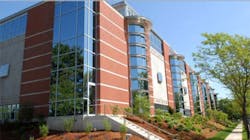We continue our series of stories on the leading geographic markets for data center space. Data Center Frontier is partnering with DatacenterHawk to provide in-depth market reports on each city we profile. Read on for an in-depth look at what’s driving Boston data center market.
Download the full report here.
Strong clusters of customers in higher education, biotechnology and the pharmaceutical sector drive demand for data center space in the Greater Boston market. The region is known for the suburban Route 128 technology corridor, as well as a strong startup ecosystem in the city, fed by graduates of Harvard and MIT. As one of the major cities on the Route 95 corridor, Boston is a regional employment center for New England and home to many enterprise companies.
The Greater Boston data center market is primarily focused on colocation services, but a number of wholesale providers compete in the region and are seeing demand from a growing market for Big Data analytics and high-performance computing. The region’s data centers are distributed, with a cluster of facilities downtown anchored by a carrier hotel (Markley Group’s One Summer Street), as well as multiple data centers ringing the city along Route 128.
Boston is home to 884,000 square feet (SF) of commissioned data center space, representing
88 megawatts (MW) of commissioned power, according to market research from datacenterHawk. In the fourth quarter of 2016, the vacancy rate for the region was 14.8 percent.
Boston is home to 884,000 square feet (SF) of commissioned data center space, representing 88 megawatts (MW) of commissioned power. (Graphic: DatacenterHawk)
Most of the data center customers in the Boston market are local to the region. As with other major Northeast cities, Boston’s market is influenced by the relatively high cost of power, which is a challenge for users with large footprint requirements.
As with other major Northeast cities, Boston’s market is influenced by the relatively high cost of power, which is a challenge for users with large footprint requirements.
As a result, service providers and facilities in Boston have focused on supporting key sectors of the local tech economy, including healthcare, biotech and pharmaceutical companies and software startups.
In terms of size, Boston is meaningfully smaller than the five largest U.S. data center markets (Northern Virginia, Dallas, Chicago, Silicon Valley and New York/New Jersey), which each have in excess of 2 million square feet of commissioned space. Current levels of demand are well supported by the available supply of data center space. Several providers are adding new capacity to support future growth, but these expansions are relatively modest in scope and unlikely to be disruptive to pricing or competition.
The Boston Market
Large cities with growing economies create data center demand. With the ninth-largest economy in the US by GDP, Boston naturally attracts attention from data center professionals. Along with New Jersey, New York, and Northern Virginia, Boston holds a place as one of the more prominent data center markets on the East Coast, specifically in the Northeast. Boston is an appealing market for a number of reasons:
- Proximity to Large, Northeastern Cities – The stable climate and geographic proximity to New York and Northern New Jersey enables Boston to function as a disaster-recovery location for data center users with existing infrastructure in these areas.
- Diverse Economy – Boston has a relatively diverse economy, with manufacturing, IT, financial, education, business, and healthcare industries. The Massachusetts Bay Area is home to 12 Fortune 500 companies, such as Liberty Mutual and Staples. The area also boasts a healthy unemployment rate of 4.2%, and hasa future job growth rate of 38.71% over the next ten years.
- Growing Interest in Edge Markets – A number of data center operators are expanding their focus to edge markets. As a less developed data center market with a high population, Boston is an ideal candidate as an edge market.
- Innovative Tech Hub – Boston’s tech presence is growing due to the presence of major educational institutions, such as MIT and Harvard. According to a Forbes’ article on tech growth in Boston, a large portion of the growth is due to Boston’s focus on biotech. In order to compete with the broad tech focus in Silicon Valley, other markets must excel in one primary area of tech focus. Boston currently leads the world in biotech startup activity, giving the city the ability to compete with other major tech markets.
Boston’s tech presence is growing due to the presence of major educational institutions, such as MIT and Harvard. According to a Forbes’ article on tech growth in Boston, a large portion of the growth is due to Boston’s focus on biotech.
In addition to large campuses, both colocation and cloud providers are constructing their individual facilities on a massive scale.
Boston’s industrial power cost is higher than most major markets, making hyper-scale data center projects somewhat expensive. While the hyper scale trend may not work in Boston, data center operators are still able to find success. To offset the high costs, providers can construct highly efficient data centers, capable of maximizing power usage. Providers can also offer highly scalable solutions where tenants pay for the power they actually need, without leaving power leftover just in case.
Over the following weeks, we will continue to explore aspects of the Boston data center market, including supply and demand trends and the current business environment.
For more on the Boston market, we invite you to download the Data Center Frontier Special Report: The Boston Data Center Market, sponsored by Digital Realty.
About the Author


